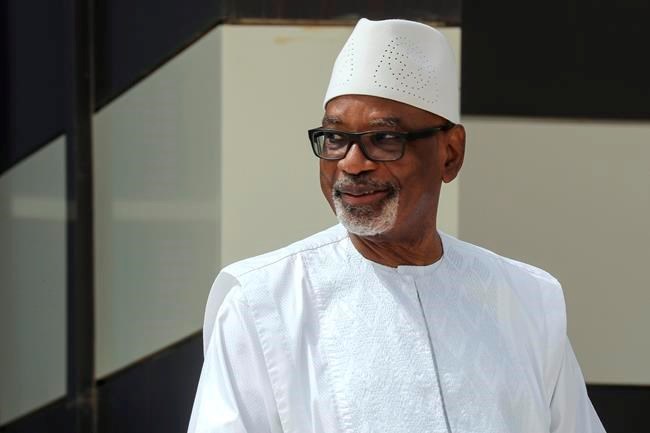BAMAKO, Mali — Ibrahim Boubacar Keita, the Malian president ousted by a military coup in August, was evacuated late Saturday to the United Arab Emirates for medical treatment, a diplomat said.
The 75-year-old’s health has been in question since he was hospitalized following his detention for 10 days by the military junta now in power.
He left Mali with his wife, Aminata Maiga Keita, an attache, two doctors and four security agents, said the diplomat with knowledge of the situation but who insisted on not being quoted by name because he was not permitted to speak to press on the matter.
The plane was dispatched by the United Arab Emirates following a request from Malian authorities and Keita, so he can be treated at a military hospital in Abu Dhabi, the diplomat said.
Keita had been moved to his residence earlier this week after hospitalization at a private clinic under the tight security of the junta.
Leaders of the junta had said they were open to whatever treatment he needed to get, even if in another country.
The junta, which calls itself the National Committee for the Salvation of the People, is now running Mali under the leadership of Col. Assimi Goita.
Keita, who was first elected in 2013, had three years left in his term when mutinous soldiers detained him at his residence after firing shots outside the house. Hours later, he appeared in a midnight broadcast on state television, telling Malians he would resign immediately so no blood would be shed for him to stay in power.
Officials from the junta had said Keita was being held at the barracks only for his own protection. A protest movement against Keita’s presidency saw tens of thousands demonstrate in the streets in the months leading up to his overthrow.
A mediation delegation led by former Nigerian President Goodluck Jonathan met with Keita while he was in military custody, and they later told journalists that Keita did not want to try to return to power.
The international community has decried Keita’s ouster, and the regional bloc ECOWAS has imposed sanctions on Mali, shutting borders, halting financial flows and threatening further sanctions.
Keita’s release was one of the demands of ECOWAS, so his evacuation for medical treatment might play
There are worries that the political vacuum brought by the coup could allow Islamic extremists to expand their reach. A similar coup in 2012 led to the militants overrunning major towns in the north where they implemented their strict interpretation of Islamic law, such as amputating the hands of those charged with theft.
A French-led military operation in 2013 ousted the extremists but the Malian military and its partners have faced an insurgency ever since.
On Saturday, two French soldiers working with Operation Barkhane were reported killed in the Tessalit region of northern Mali, according to a statement from French
France has more than 6,500 soldiers currently engaged in foreign operations, with more than 5,000 as part of Operation Barkhane, according to the
“In the Sahel, France is and remains engaged alongside Mali, Burkina Faso, Mauritania, Niger and Chad in this relentless fight against armed terrorist groups,” the statement said.
___
Associated Press writer Carley Petesch in Dakar, Senegal, contributed to this report.
Baba Ahmed, The Associated Press

